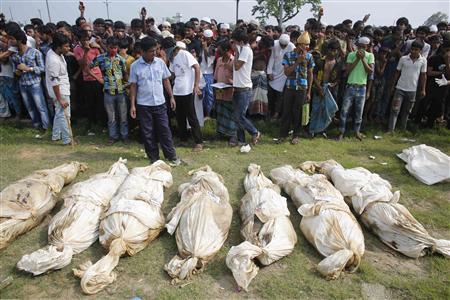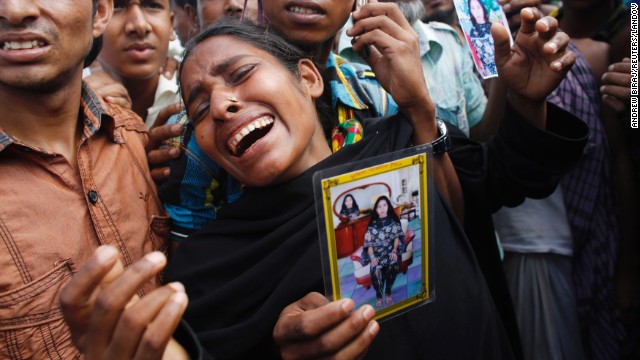by B. R. GOWANI

 woman mourns before a mass burial in Dhaka, Bangladesh, on Wednesday, May 1, a week after the collapse of the Rana Plaza building in nearby Savar. At least 410 people died when the building, which housed garment factories and shops, collapsed on April 24. Heavy machinery is helping remove wreckage at the site. Workers continue to find bodies, many of them decomposed and difficult to recognize. PHOTO/CNN
woman mourns before a mass burial in Dhaka, Bangladesh, on Wednesday, May 1, a week after the collapse of the Rana Plaza building in nearby Savar. At least 410 people died when the building, which housed garment factories and shops, collapsed on April 24. Heavy machinery is helping remove wreckage at the site. Workers continue to find bodies, many of them decomposed and difficult to recognize. PHOTO/CNN
The death of over 400 Bangladeshi workers, as a result of a building collapse, working in the garment factories is neither the first such incident nor is it the last one. Also to remember is the fact that the flow of fake tears running from the eyes of the Westerners is not going to stop either.
The New York Times’s editorial of 25 April has got plenty of advise for the Bangladeshi Prime Minister Sheikh Hasina Wazed and others, but very little for the Western companies. And what it says is laughable.
In addition to demanding and paying for safer factories, they [Wal Mart, Sears, H&M, Gap, and others] need to put pressure on the owners and Ms. Hasina to allow unions and improve inspections. They are Bangladesh’s customers, and what they say carries real weight. It’s time they spoke up.
Why the hell would companies who don’t like unions in the US would want to support unions in Bangladesh? The Wal Mart has one of the worst records in the US for mistreating its workers and not supporting the unions. The reason for going to Bangladesh (and other countries) for production and manufacturing purpose is to avoid whatever few laws are still in effect in the US and other Western countires that takes care of workers’ welfare. Of course, the primary motive is more profit.
Of the richest eleven persons in the US, six belong to the Wal Mart family, with a net worth of $93 billion. In 2010, Michael Duke, the Wal Mart CEO, was earning every hour what his average employee took 365 days to make!
The workers in Bangladesh make between 3000 taka ($35) and 5,500 taka ($70) a month. Their demand for a raise of $19 to $25 per month was not met due to government’s inaction.
It would have made sense and would have shown some solidarity with the workers who lost their lives and others who are working like animals, if the editorial had said that the US companies in Bangladesh should be prosecuted in the US courts for criminal negligence and should be fined hundreds of millions of dollars.
But then, these kind of things would affect the lives of people in the Western countries. The fake tears wouldn’t.
Pope Francis was much better and unambiguous when he spoke about the tragedy at a mass.
“That [38 Euros] is what the people who died were being paid. This is called slave labour,” he said. “Today in the world this slavery is being committed against something beautiful that God has given us – the capacity to create, to work, to have dignity. How many brothers and sisters find themselves in this situation!
“Not paying fairly, not giving a job because you are only looking at balance sheets, only looking at how to make a profit. That goes against God!
“There are many people who want to work but cannot. When a society is organised in a way that not everyone is given the chance to work, that society is not just.”
The burial took place on May 1, the International Workers Day or the Labor Day. The significance of this day can’t be ignored. The Labor Day began in 1890 as a result of the death of workers in police firing in Chicago in 1886. The incident is known as the Haymarket Affair. However, the United States and Canada celebrates Labor Day, not on May 1 but on the first Monday of September!
B. R. Gowani can be reached at brgowani@hotmail.com
